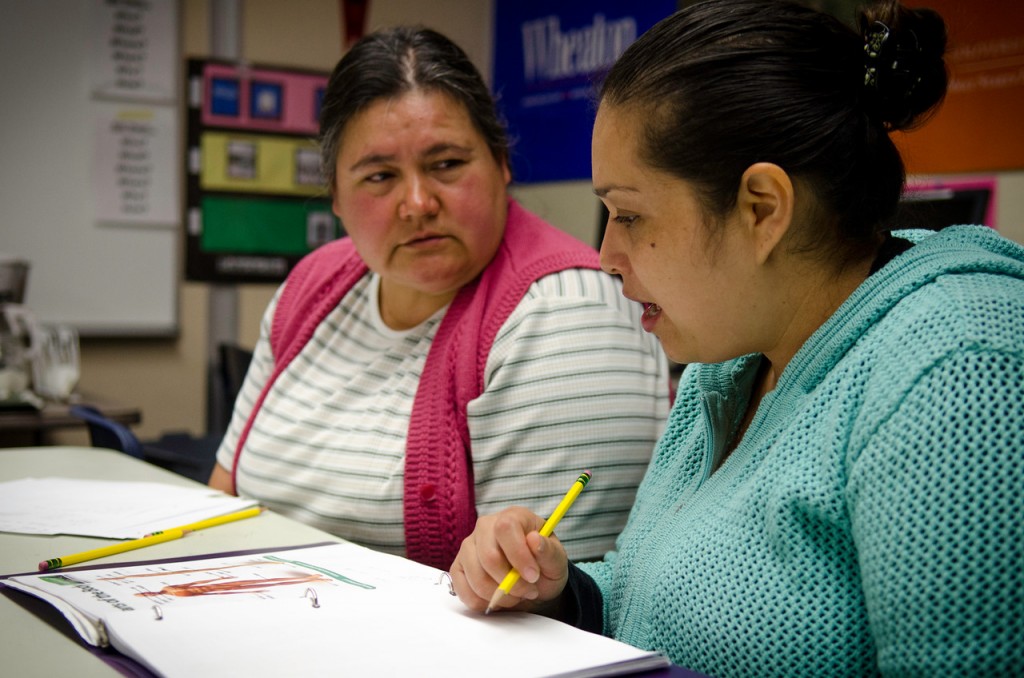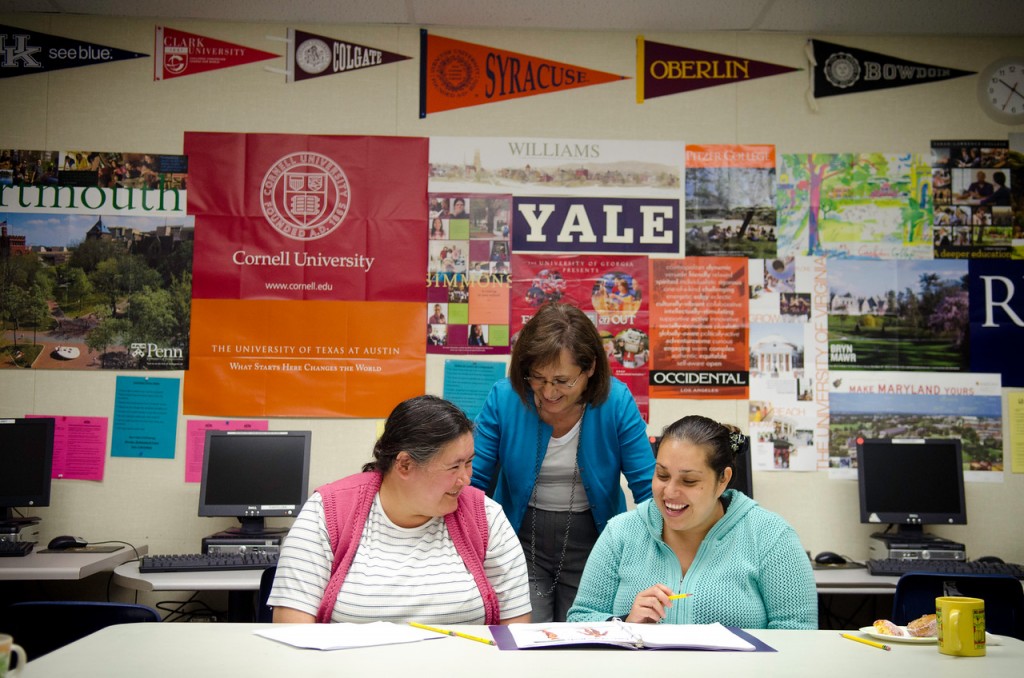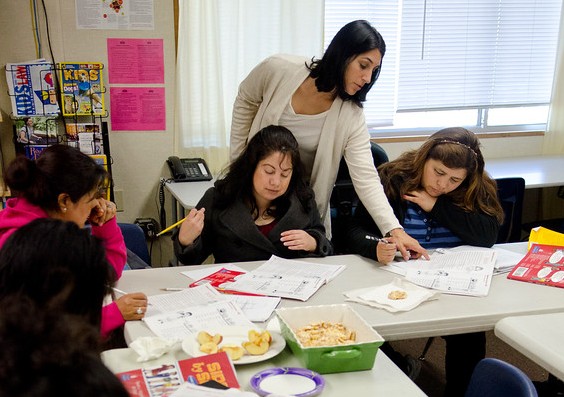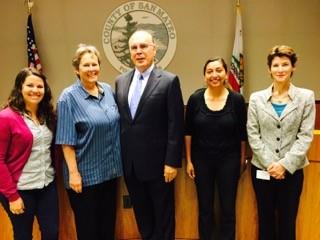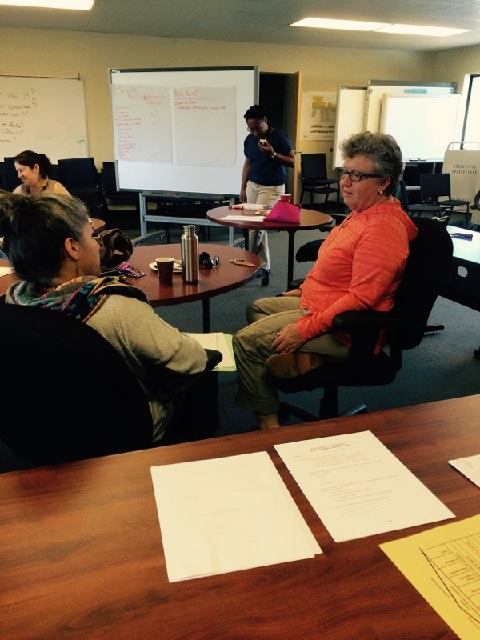At Puente’s farmers’ market last week, the only thing you couldn’t eat was on the back of a bicycle, getting mixed in a pedal-powered blender.
“Usually we make smoothies with it, but I thought, why not make paper pulp?” said Mona Urbina. The Youth Program Coordinator for Pie Ranch hit upon the imaginative idea when she was looking around for a fun and enriching way to engage children at Puente’s weekly farmers’ market, Pescadero Grown. So Urbina made “seed bombs” with the kids seated around a picnic bench. After taking turns pedaling the blender, the children took the paper pulp to a cloth-lined strainer and mixed in some seeds. Then they squeezed and strained water out from the admixture and pressed it into a rubber ice cube tray of heart shaped molds. They also made round ones out of compost and clay, adding water and the seeds of cosmos flowers.
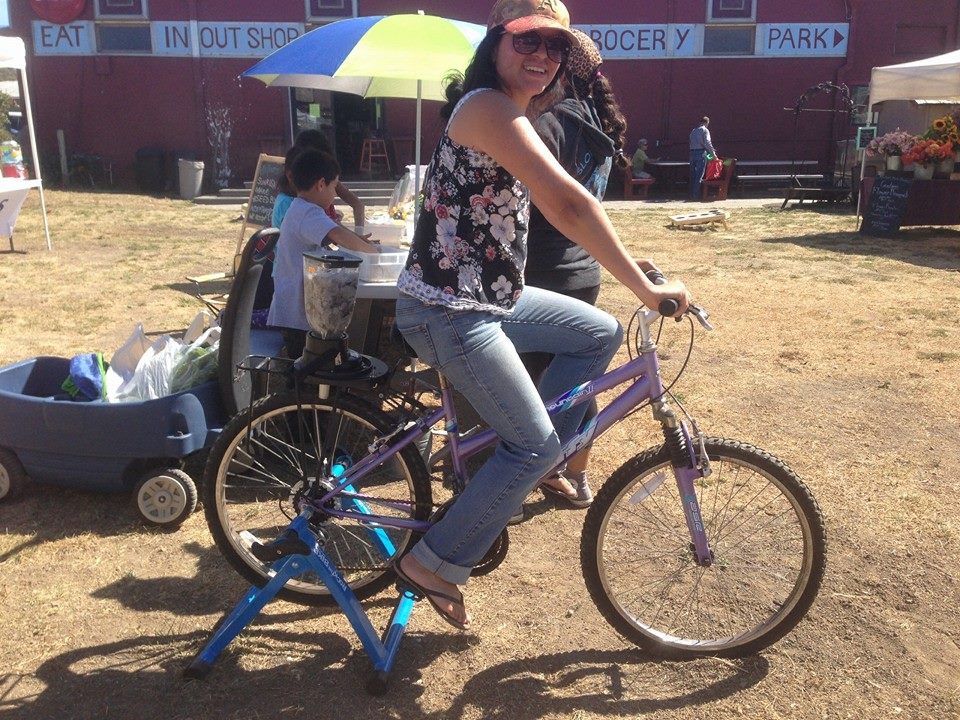
Mona Urbina shows off the blender bike at the market.
“Can I pour the water?” asked Samara, 4, while her mother Allegra Turner shopped for strawberries, chard and other produce to bring home for her family.
“We’re here at least once a month. I’m really into fresh produce, and this is super fresh. The kids’ crafts are really great, too,” said the La Honda mom, inclining toward Samara and her friend, who ran off to play with the beanbag toss after they finished their flower experiment.
The children left the market with the delicate seed bombs clutched in their small palms and instructions from Urbina. “We’re going to let this dry, and when it rains, we’re going to throw it out into a field. The sun will help it grow into a flower plant,” she told them.
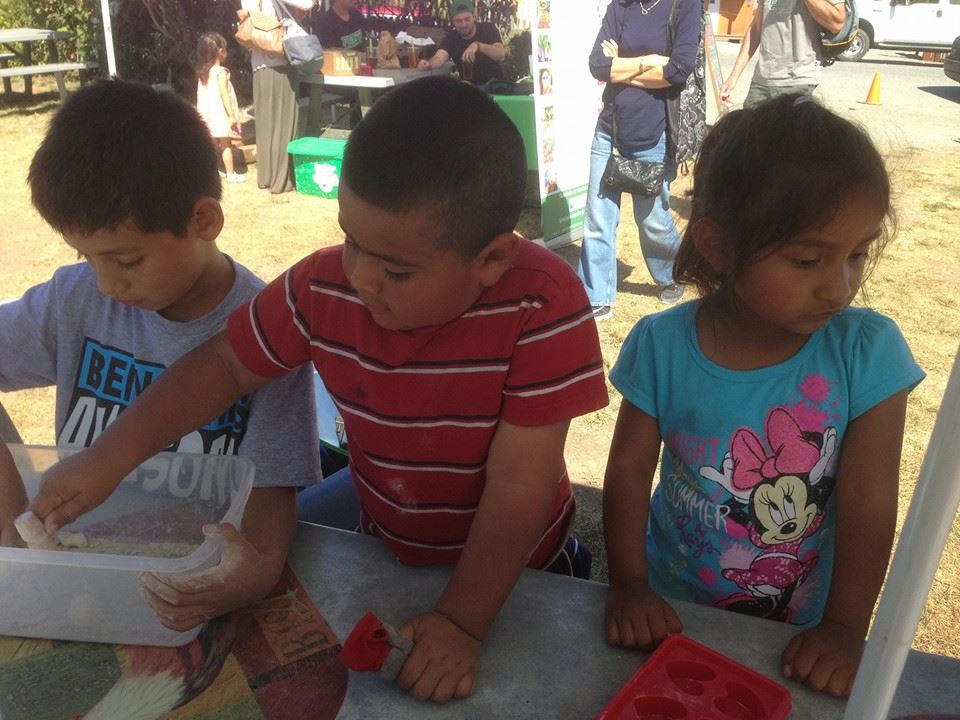
Children making seed bombs together.
The message was no accident. To visit the Pescadero Farmers’ Market is to make the connection with nature that consumers skate over at supermarkets, and to do so in a community setting.
It’s not just any honey for sale – it’s State Street Honey and the owner, Todd Parsons, is on hand to describe the process of raising his own queen bees. Due to excellent sales at the Pescadero market this year and a few other retailers, he has almost sold out.
Everything has a story. The Early Girl tomatoes – they’re the result of dry farming, which concentrates all the sweetness of the fruit with a minimum of watering. Two Pescadero farms, Blue House and Fly Girl, have perfected the technique, and their farmers describe it as you reach a bright red tomato, pleasing to the eye and sticky to the touch.
In addition to its seasonal offering and CSA, Pie Ranch leads children’s activities once a month at the Pescadero market, always inspired by its mission of food education and food justice. The Half Moon Bay library comes twice a month with art and science projects for the kids. And Puente recruits volunteers who have ideas for fun and stimulating group activities, like screen-printing.
Now in its fifth summer, Puente’s farmers’ market is at the halfway point in a bountiful season that has spanned everything from apples, leeks, summer squash, heirloom tomatoes and Brussels sprouts to sunflowers, dahlias, potatoes, locally caught fish, and grass-fed beef from local producers Markegard Family Grass-Fed and LeftCoast GrassFed. Up next in the weeks to come: peak eggplant, peppers and melons, yielding to a fall harvest of parsnips and sweet potatoes.
“This season has been great for us so far. Our tomatoes and Padrones have been booming. Some things come into season later here on the coast, like melons, which we’ll have soon,” explained Kaila Clark, marketeer for Fly Girl Farm.
Puente founded the Pescadero Grown! Farmers’ Market as a nonprofit venture with three central goals: to boost food sales for local farmers; to get fresh, affordable, healthy food onto the plates of local residents, including low-income ones; and to establish a community crossroads for people of white and Latino backgrounds to mingle, bring their kids, dance to live music, and learn about important social services available through Puente and its nonprofit partners.
The market’s principal funders are San Mateo County, TomKat Charitable Trust, and the Peninsula Open Space Trust.
It is the sort of place you might run into your high school teacher choosing a bundle of kale or bringing their bicycle for a fix-it appointment at Puente’s Bike Booth, one of the market’s most popular attractions.
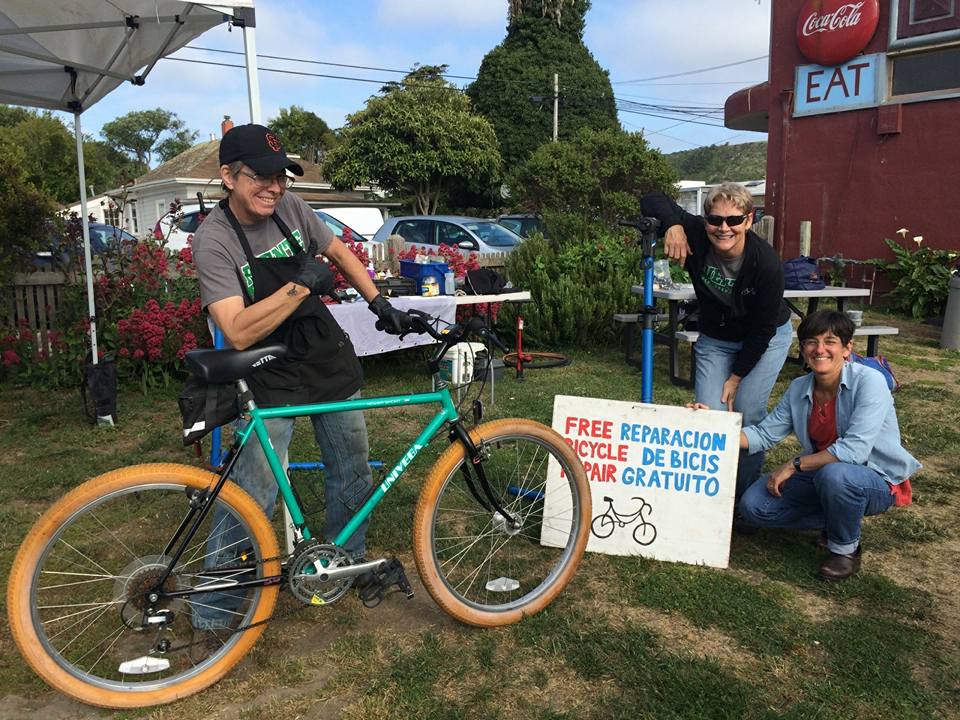
Every, Rosemarie, and Liz are a few of the people who support bike repair at the market.
Market Manager Charana Binford surveyed a late August market with a satisfied expression.
“I’m so happy with how the market turned out this year,” she said. “It feels more and more like a communal area to enjoy. And toward the later hours you see kids coming and running around and climbing the trees and playing with the hula hoops.”
It’s tremendously appealing, and it has found its audience. The word for this year’s market has been “more”: more music, more vendors (including one who sells handmade driftwood art), more kids’ activities, and more shoppers than ever buying from local farmers.
“There was one day in July where we had 500 people come through here in one afternoon,” marveled Binford. “That was a record.”
An especially good sign: a record number of qualifying shoppers are also using Puente’s discount Pescadero Tokens program to double their food purchases, now worth up to $20 for every $20 they want to spend, according to Binford.
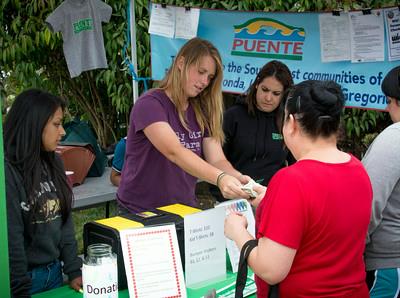
Charlea Binford assists a member of the community with receiving Pescadero Grown Tokens.
“I have more people than ever coming to use the tokens consistently,” she confirmed. The market is the only place in Pescadero where shoppers can use nutrition discount programs like WIC and CalFresh.
And it may be the only farmers’ market with a stand set up by a dental practice. Dirk Alvarado, Executive Director of Sonrisas Community Dental Center in Half Moon Bay, handed out toothbrushes, floss and other goodies to shoppers and children while reminding them to take care of their teeth. The nonprofit dental clinic has partnered with Puente to serve local farm workers and their families.
“People have a natural fear of the dentist, and we’re here to make that less scary,” said Alvarado.
Even the beats were mellow: a mix of hip-hop and oldies, curated by local DJ Anti Dope. Farmageddon owner Chuck Harper caught the vibe. “It’s good here. We try to help out. It’s not all about making money – otherwise, we wouldn’t be here. It’s more about hanging out and being a part of the community,” he said.
Catch Pescadero Grown on Thursdays from 3-7 p.m. at the Pescadero Country Store, 251 Stage Road. As per tradition, this year’s market will end on a high note October 29 with a Dia de Los Muertos (Day of the Dead) celebration that includes a community altar. For details, visit http://pescaderogrown.org/

